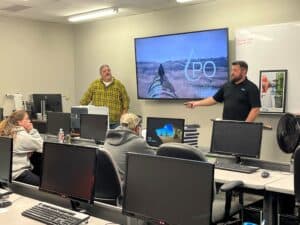Water and wastewater operators have a direct impact on daily life and public safety. Often, they are not recognized for the vital service they provide.
The vice president of Water Professionals International (WPI), Tom Healy, had the opportunity to speak at Des Moines Area Community College in a program educating future operators in various water/wastewater positions. His goal: to bring operators into the limelight and give them the recognition they deserve. This is done through the Professional Operator (PO) program — the first internationally recognized professional designation for water and wastewater operators.
This program offers a chance to bring confidence to the consumer, recognition to the operator, and pride to the industry. Becoming a professional operator is more than adding two letters behind one’s name. Operators who decide to take the step of obtaining this designation dedicate themselves to the mission of protecting public health, demonstrating professionalism, a willingness to learn, and agreement to a code of conduct.
“Earning a PO designation imparts a level of professionalism. It says that you took that extra step, and you are looking at this industry wide.” Tom explains. When someone is certified as a PO, he or she has gone beyond the level required in the local jurisdiction. Certification shows versatility and is an important stepping stone towards achieving reciprocity for water and wastewater professionals. WPI designed this program with that in mind, as a beacon to lead the way toward industry-wide standardizations.

Reciprocity offers the chance for the water and wastewater authorities to broaden their reach. The exams for PO certification are dedicated to showcasing full knowledge and understanding of duties, not just in the operator’s home district, but throughout the industry. So, in the event of a disaster, a personal move to a new jurisdiction, or countless other scenarios, a certified operator has a better chance of achieving reciprocity and fewer interruptions to the job that needs done.
To become a PO, an operator must register with Certemy, WPI, and the PO’s online certification management software, submit an application, and pass a standardized exam. Once the operator meets all the criteria, he or she earns the right to be called a professional operator. Just like that, the operator is tied to a community of like-minded peers and will be invited to POwer events hosted by WPI. POwer events include a pinning ceremony, where the official PO pin is secured to the operator in front of peers, family, colleagues, and the community.
Tom closes his discussion by saying, “Through commitment to operator certification and professional advocacy, we are asking the industry to reimagine certification and what it means to communities everywhere. We want to help people realize that our greatest assets are the men and women who run water facilities.” WPI hopes that the Professional Operator program will lead others to this career and provide more opportunities for advancement and success.



